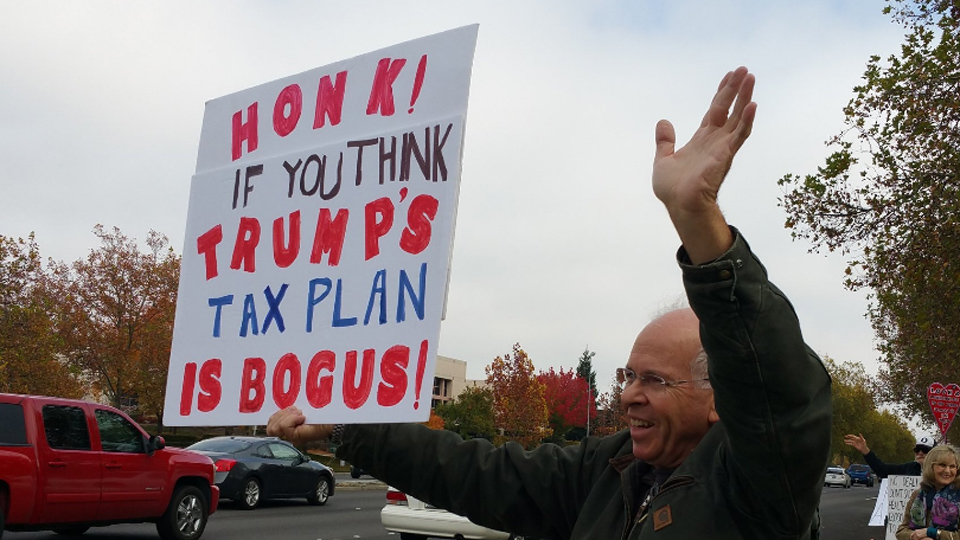
WASHINGTON—With President Donald Trump touring the country and meeting GOP senators to claim his tax cut for business and the rich will really help middle income earners, Communications Workers President Chris Shelton is challenging Trump, the Republicans, and their business backers to—in so many words—show us the money.
Specifically, Shelton wrote to eight corporate CEOs whose firms employ hundreds of thousands of CWA members pushing them to take Trump’s $4,000-per-taxpayer cut for the middle class and put it in their workers’ paychecks.
He asked for responses, in the form of a signed agreement to add to union contracts, by Dec. 1.
Shelton’s challenge comes just after the non-partisan Congressional Budget Office released its latest analysis of the tax cut, on Nov. 26, showing it would be even worse for the working class, and better for the rich, than originally forecast. And the National Women’s Law Center chimed in, saying it would particularly hurt working women and families.
Montana’s Steve Daines and Wisconsin’s Ron Johnson say the tax cut gives too much to big business and not enough to small business, and now lean against it. If they, and a third GOPer, join all Senate Democrats and independents in voting “no,” the tax bill is dead, as it would have only 49 votes, all from Republicans, in the 100-member Senate.
As part of the lobbying by workers and their allies to pick up those three vital GOP votes, Shelton wrote to the CEOs of Verizon, AT&T, CenturyLink, Frontier Communications, American Airlines, General Electric, NBC Universal, and ABC Entertainment stating they should back up Trump’s pledge and put the money in their workers’ pockets, not their own.
“Politicians are actively using” Trump’s argument, taken from his own Council of Economic Advisors, “to sell a corporate tax rate cut to American workers, including our members,” his letter to the CEOs says. Prove it, his missive adds.
“In the interest of your U.S. operations and of our members, I ask that you sign the agreement below”—Shelton attached a “Memorandum of Understanding,” with language often found in union contracts—“to ensure any corporate tax cut does indeed benefit workers and to ensure the bill’s treatment of overseas profits will not result in domestic job loss.” The tax cut effectively taxes those profits at zero, Shelton noted.
If past is prologue, Shelton has already had an answer of sorts: “No.” The prior week, a top Trump economic advisor Gary Cohn, spoke to more than 100 corporate CEOs in New York and asked for a show of hands from those who would use extra money their firms get from the tax cut to hire more workers or raise pay. Fewer than five raised their hands. “So few?” Cohn asked.
Meanwhile, the CBO incorporated spending changes—such as mandatory cuts in federal programs—the tax cut bill would cause, in its latest estimates of its impact. And that only worsened the hit on the poor and the middle class.
The CBO’s chart shows if Congress passed and Trump signed the tax cut, people earning $10,000 or less would pay $1.54 billion more in 2019 than if there was no change. That would rise to $10.07 billion by 2027. Those earning $10,000-$30,000 would pay $1.04 billion combined in 2019, rising to $32.78 billion in 2027.
Those earning $30,000-$75,000—the middle-income group basically—would get a tax cut of $32.33 billion in 2027, but would be paying $16.86 billion more in 2027, when tax breaks thrown into the legislation for the middle income group expire. Trump and the GOP have touted those breaks—a doubling of the personal exemption—to argue the tax cut benefits the middle class.
People earning at least $1 million would get a $34.1 billion tax break in 2019, declining to a $5.78 billion break eight years later.
The tax bill offsets the doubling of the personal exemption by killing personal income tax deductions. They include deductions for state and local taxes, charitable contributions, personal business expenses (including union dues), a partial deduction of medical expenses, and even flood and hurricane losses. The total cost to taxpayers: $974 billion.
The wipeout of those tax breaks would be so huge that in 2027, individuals overall, even including the rich, would pay $40 billion more combined in taxes, the chart shows. Businesses would still get $1 trillion chopped off their taxes, as the bill makes their tax cuts permanent.
“Repealing the deduction for state and local taxes would be a hard hit for families in states like New Jersey, Maryland, and Connecticut with higher state and local taxes and high participation in this deduction,” according to Sarah Hosmer of the National Women’s Law Center.
“Repealing this deduction would contribute to the tax increase for millions of families over the next decade. It would also likely lead to many states and localities reducing their tax rates, leaving less revenue for critical state and local programs. Oh, and did we mention that both the House and Senate bills repeal this deduction for individuals filing taxes, but corporations can still claim the deduction as a business expense? How does that help make the tax code fairer for ALL of us?”












Comments